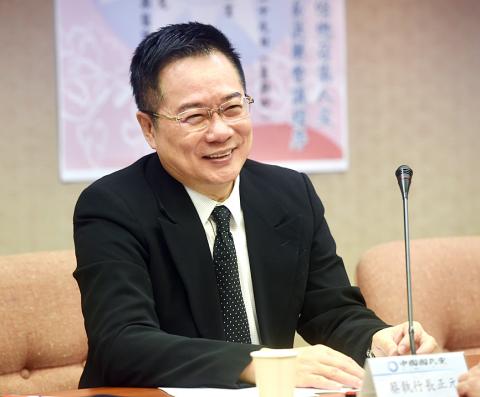The Taipei District Prosecutors’ Office yesterday interviewed former Chinese Nationalist Party (KMT) lawmaker Alex Tsai (蔡正元), and searched his residence and office in connection with a probe into embezzlement allegations related to the finances of Central Motion Pictures Corp (CMPC, 中央電影公司), sources said.
Tsai was still being questioned at press time last night.
Tsai, who served as executive director of the KMT Central Policy Committee and party spokesman after giving up his legislative seat, was CMPC president from 2006 to 2007.

Photo: Chien Jung-fong, Taipei Times
Nine other people were questioned by prosecutors, including Tsai’s wife, Queena Hung (洪菱霙), and her father, Hung Hsin-hsing (洪信行), and several of their residences and offices were also searched.
In August last year, Journal on the Rule of Law publisher Huang Yueh-hung (黃越宏) went to the prosecutors to accuse Tsai of siphoning off NT$170 million (US$5.59 million at the current exchange rate) of CMPC funds during his tenure as its president under the pretext of capital reductions.
Huang accused Tsai of embezzling the money for the benefit of his wife, his father-in-law and himself, and laundering it through Queena Hung’s Chintsuan Co (金鑽) and Hung Hsin-hsing’s Apollo Co (阿波羅) — a company founded by Tsai.
Sources said the prosecutors authorized the searches and the filing of official interview requests because they suspect him of pocketing NT$300 million from the CMPC.
It is not the first time that Tsai has faced questioning or a potential court case over business practices at CMPC.
The Supreme Court on May 21 last year ordered Tsai to return NT$170 million to CMPC that it said he had illegally pocketed during CMPC’s 2005 sale and subsequent capital reduction efforts.
Tsai announced in the middle of last month that he was stepping down from his KMT posts as of the end of the month because he would be moving to China to take up the post of chairman of Jiangsu Min’An Automotive Co (敏安汽車).
The Ill-gotten Party Assets Settlement Committee has scheduled a public hearing on CMPC for Aug. 16, committee spokeswoman Shih Chin-fang (施錦芳) said yesterday.
The committee announced on April 10 that it was in the process of investigating the KMT’s sale of CMPC, once a state-owned enterprise.
Critics have long said that the KMT sold CMPC off cheaply to shadowy investment groups owned by party loyalists in anticipation that the party’s assets would one day become legal and political liabilities.
CMPC possessed several valuable properties that it obtained through the government, which were sold to its new owners following its transfer from the KMT, at a price that “plainly did not correspond to the properties’ market value,” the committee said in April.
It also said it would hold the parties involved in the deal responsible for any loss of public funds that might have occurred.
A day after the committee’s announcement, the Democratic Progressive Party (DPP) called on prosecutors to question former president Ma Ying-jeou (馬英九) about his role in the sale of CMPC, China Television Co (中視) and Broadcasting Corp of China (中廣), which he oversaw when he was the KMT chairman.
Additional reporting by CNA and additional staff writer

Taiwan is gearing up to celebrate the New Year at events across the country, headlined by the annual countdown and Taipei 101 fireworks display at midnight. Many of the events are to be livesteamed online. See below for lineups and links: Taipei Taipei’s New Year’s Party 2026 is to begin at 7pm and run until 1am, with the theme “Sailing to the Future.” South Korean girl group KARA is headlining the concert at Taipei City Hall Plaza, with additional performances by Amber An (安心亞), Nick Chou (周湯豪), hip-hop trio Nine One One (玖壹壹), Bii (畢書盡), girl group Genblue (幻藍小熊) and more. The festivities are to

Auckland rang in 2026 with a downtown fireworks display launched from New Zealand’s tallest structure, Sky Tower, making it the first major city to greet the new year at a celebration dampened by rain, while crowds in Taipei braved the elements to watch Taipei 101’s display. South Pacific countries are the first to bid farewell to 2025. Clocks struck midnight in Auckland, with a population of 1.7 million, 18 hours before the famous ball was to drop in New York’s Times Square. The five-minute display involved 3,500 fireworks launched from the 240m Sky Tower. Smaller community events were canceled across New Zealand’s

‘IRRESPONSIBLE’: Beijing’s constant disruption of the ‘status quo’ in the Taiwan Strait has damaged peace, stability and security in the Indo-Pacific region, MOFA said The Presidential Office yesterday condemned China’s launch of another military drill around Taiwan, saying such actions are a “unilateral provocation” that destabilizes regional peace and stability. China should immediately stop the irresponsible and provocative actions, Presidential Office spokeswoman Karen Kuo (郭雅慧) said, after the Chinese People’s Liberation Army (PLA) yesterday announced the start of a new round of joint exercises around Taiwan by the army, navy and air force, which it said were approaching “from different directions.” Code-named “Justice Mission 2025,” the exercises would be conducted in the Taiwan Strait and in areas north, southwest, southeast and east of Taiwan

UNDER WAY: The contract for advanced sensor systems would be fulfilled in Florida, and is expected to be completed by June 2031, the Pentagon said Lockheed Martin has been given a contract involving foreign military sales to Taiwan to meet what Washington calls “an urgent operational need” of Taiwan’s air force, the Pentagon said on Wednesday. The contract has a ceiling value of US$328.5 million, with US$157.3 million in foreign military sales funds obligated at the time of award, the Pentagon said in a statement. “This contract provides for the procurement and delivery of 55 Infrared Search and Track Legion Enhanced Sensor Pods, processors, pod containers and processor containers required to meet the urgent operational need of the Taiwan air force,” it said. The contract’s work would be